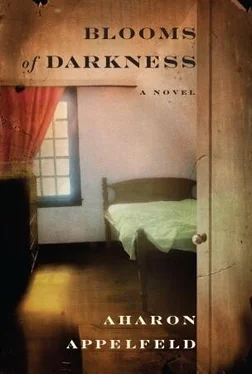“Mariana watches over me,” the fear within him replies.
“You’re endangering us all,” Victoria says, the anger visible in her brow.
“I’ll go soon.”
“You already promised and didn’t keep it.”
“This time I will,” he says, trying to evade her furious eyes.
“We’ll see,” Victoria says, and closes the door.
That’s a threat, and Hugo knows it. The thought that Victoria will inform on him and that soldiers will come and surround the house becomes more palpable with every passing moment. Hugo is so frightened that he checks the escape hatch twice and sips a few drops from Mariana’s bottle. He feels dizzy and immediately falls asleep. Toward evening Mariana comes to the doorway with a bowl of soup in her hand. Hugo tells her that Victoria has come to the closet, and that her words were harsh and evil.
“Don’t worry. We’re going to leave this place soon.”
“Where will we go?”
“Anywhere, just not here.”
Life here is tense and constricted, and Hugo wants very much to write the details down in his notebook. But the words, for some reason, aren’t within his reach. It’s now clear to him, though not with a clarity that can be garbed in words, that everything that has happened around him will be brought to light one day. And he is gathering it all up. Or, rather, things are being gathered up within him by themselves. Mariana apparently senses this, and she keeps saying, “Don’t remember me as an unfortunate woman. Mariana has been battling on this front since the age of fourteen. It’s a merciless front. I refused to be a servant in rich people’s houses, and for that I was punished. If you ever remember this woman who was called Mariana, write that she fought to the end of her strength, and that in the end her heart’s beloved freed her from prison.”
“Who is that?”
“You, and none other.”
Meanwhile, Mariana has another hard night. One of the guests shouts at her, calls her names, and keeps asking her to do things that apparently disgust her. He complains, and Madam scolds her and writes a warning in her account book. Hugo hears everything, and his heart tightens.
But the following night Mariana has no guests, and she invites Hugo to come to her. Mariana is soft and devoted. He feels her arms and legs exquisitely, and he has a strong desire to fondle her breasts.
And so the days pass — a mixture of disquiet, fear, and powerful pleasures. Hugo’s earlier life slips far away from him, and it is now a pale patch that gradually evaporates and fades away.
Papa, Mama, where are you? He asks without meaning it. They are no longer within him. In vain he tries to raise them up from the depths of his memory. They refuse to dress in their image. They have also departed from his dreams. Mariana fills his dreams.
What will be, and how will his life go on? Hugo doesn’t think about that. He has become part of this strange place and can easily identify some of the voices: that of the authoritative and venomous guard; that of Victoria, who complains that she works day and night and gets angry at a woman named Sheba, who gobbles food down without measure or proportion and leaves empty pots; and of course the thin, childish voice of Kitty. Hugo is sorry that he’ll soon be leaving. In his heart he consoles himself with the thought that Mariana will be with him in his wanderings. And without her nightly obligations, she will be all his.
Hugo imagines his wanderings with Mariana in the Carpathian Mountains as a voyage of pleasure and contemplation— like his golden summer vacations with his parents. But now all the responsibility will be upon him.
Hugo knows that his imagination is not impartial, but the desire to be with Mariana, far from other people, plants words in his mouth that he does not ordinarily use. Sometimes they sound frightfully hollow to him, and sometimes an unpleasant artificiality arises from them.
“Do you forgive me?” he says.
“For what?”
“Because I’m not expressing myself properly.”
“What are you talking about?” Mariana says, and bursts out laughing.
But for now there is rain again, and cold. “Next week we’ll leave,” says Mariana, putting off their departure. The army of occupation is sent to the front, and only a small unit that is looking for Jews is left in the city. They, in fact, are the clients of The Residence.
Clearly the war is coming to an end. There is no longer any doubt that the Germans are in trouble. The guard, who always spoke in praise of the German army, has stopped doing so. Now he speaks with the same words of praise about the Russian army. They knew how to retreat, he says, cunningly tempting the Germans to plunge into the snowy plains after them. The Germans’ end will be like that of Napoleon. The winter, not the tanks, will win the war.
The women hear this and are afraid. It is clear to everyone that those who served the Germans will be punished. The Russian army bears grudges and takes revenge.
“What will they do to us?” asks a young voice that Hugo can’t identify.
“After every war, there are pardons. Sins like these aren’t considered serious,” says the guard in his authoritative voice. That statement doesn’t assuage the fears of the woman who asked, and she wants to know whether the pardon will also apply to her. The guard’s patience wears out, and he answers without looking at her.
“You have nothing to fear,” he says. “They won’t rape you.”
The guests have become very few. At night the women sit and play cards and reminisce. Sometimes a confession is heard, accompanied by tears. Mariana is tranquil. She drinks as much as she pleases. When Mariana drinks the amount she needs, her face lights up and out of her mouth come surprising comments. She sees the future in pink colors and promises Hugo that as soon as the weather improves, they will set out.
“You’re big already,” she says, “and you should know that The Residence is nothing more than a whorehouse.”
Hugo has learned some of the secrets of the place, though there are things that remain more hidden than visible.
Now the women fight over each guest. But not Mariana. She has had enough of them, and she’s glad she can sleep in her bed with Hugo. Hugo’s joy is boundless.
“A person should bless every day and every hour.” Mariana surprises him again.
“Why?” Hugo wonders.
“Because everything can change in a moment. A day without degradation is a gift from heaven, and it should be blessed. You have to learn this, honey. Nothing is self-explanatory. We are given over into God’s hands. When He wishes to, He harms, and when He wishes to, He is beneficent.”
“Does God watch over us?”
“Always. For that reason I’m frightened. God doesn’t like these houses of sin. God loves married women who bring children into the world. He doesn’t love women like me.”
“I love you.”
“But you’re not God,” Mariana says, and they both laugh. Hugo opens the Bible again and reads the story of Joseph. Hugo feels that he, too, like Joseph, bears within him a secret that will be revealed. He, too, for the moment, has to undergo many trials, but what the future will bring him, he doesn’t know.
“You’ll be an artist,” Mariana keeps saying. “You have the right height and observant eyes. You think correctly, and you don’t let sensitivity drown you. In short, you’ll be an artist. That’s what my heart says.”
It’s strange that she, who since childhood has known hardship and has struggled, does not deny that people can have both beauty and nobility. Where did she acquire that understanding? Hugo continues to wonder about this.
Читать дальше












